Federalism: A far-fetched solution
by Manjula Fernando
|
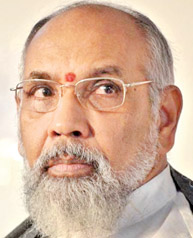
Chief Minister Northern Provincial Council C.V.Wigneswaran |
The Northern Provincial Council (NPC) resolution calling for a
Federal Constitution for Sri Lanka has triggered a spontaneous reaction
from Southern quarters.
Not only hardliners such as the JHU, NFF and the Gammanpila faction
criticised the move but also the moderate SLFP and UNP were quick to
disassociate from the proposals and declare that federalism was a
far-fetched solution in the on-going new constitution-making process.
Highways and Investment Promotion Minister Kabir Hashim said the
Government will not be troubled over minor resolutions passed in
Provincial Councils, while Minister Mahinda Samarasinghe was more
elaborate in his statement that the SLFP will not endorse a federal
constitution.
It was not clear as to what the architects of the resolution, the TNA
team in the Council led by Chief Minister C.V.Wigneswaran aspired but
certainly it seems to have put the government in a fix, taking the
on-going reconciliation process into turbulent waters.
The Sunday Observer spoke to the Northern Province Governor Reginald
Cooray, ITAK (TNA) Parliamentarian M.A.Sumanthiran, legal luminary Gomin
Dayasri and Senior Lecturer Colombo Law Faculty A. Sarvesvaran on the
hot topic.
Key features of the Resolution
Two broad linguistic states – the Northern and Eastern Province
(Majority Tamil speaking states) other seven Provinces (Majority Sinhala
speaking state)
Tamil speaking Muslims as a separate group of people unit in the
North and East, Tamil speaking Upcountry Tamils as a unit within the
rest of the country
The greater Colombo area which is cosmopolitan must be the chief
metropolitan unit of the country having a separate administration.
* The federal system of Government is adopted in preference to a
unitary system of Government.
* Muslim autonomous Regional Council in Northern and Eastern Provinces
* North Eastern State Parliament
* Official and National languages of Sri Lanka shall be Sinhala and
Tamil and English shall be the link languages.
* Adequate self- rule must be provided to these State Government and
Regional Councils
* State agencies such as the Mahaweli Authority that undermine decisions
of peripheral administrations must be done away with.
* No concurrent jurisdiction should hereafter be formulated, only
State and Federal.
* The flag of the Republic must do away with sectarian depictions.
National Anthem should be sung in Sinhala or Tamil or in both languages.
* Land within State limits must come under the control and purview of
the State Government.
* Full Police powers must be given to State Government.
* Facilitate Tamil people to hold a referendum in their areas to decide
on their political status.
* Occupying Military Force in the North and East should be made
redundant
Only a reflection of NPC views - M. A. Sumanthiran
Q: The Northern Provincial Council(NPC) passed a resolution
last Friday calling for a federal form of a constitution. This
resolution has the blessings of the TNA ?
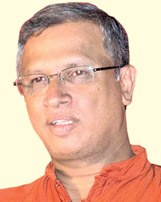 A: The NPC has TNA, UPFA and SLMC members. That is a
suggestion of the parties represented in the NPC, not only that of the
TNA. A: The NPC has TNA, UPFA and SLMC members. That is a
suggestion of the parties represented in the NPC, not only that of the
TNA.
Q: But the two Sinhalese Councillors opposed the resolution ?
A: They did not oppose the resolution. They left the
proceedings early because there was no Sinhala translation available. I
must say that what the Council had done was wrong.
They should have made the Sinhala translation available before they
discussed it. The resolution was in Tamil and there was only an English
translation available. (However, the two Sinhala Councillors walked out
in protest over the suggestion to merge the North and the East and the
demand for a federal solution. The Muslim councillor had proposed
amendments before giving his consent to vote for the resolution.)
Q: The majority Sinhalese fear the word federalism and the
Tamils despise the word unitary. To overcome this stumbling block
independent experts have proposed a solution which refers to no federal
or unitary words in it. What is the TNA’s stand on this ?
A: The word federal was introduced to this country not by the
Tamil people or Tamil leaders. It was introduced to this country in 1926
by SWRD Bandaranaike. He wrote five letters to the Morning Leader
newspaper.
Then he conducted a public lecture in Jaffna where he propagated the
federal model for this island. Then in 1931, Kandyan Chiefs went before
the Donoughmore Commission and asked for a federal structure consisting
of three units, with the same boundaries as the three kingdoms that
existed before the Portuguese arrival.
Then in 1946, when the Soulbury commission sat, the Kandyan League
again made a recommendation for a federal solution consisting of three
units. So why are the Sinhala people scared of the word ‘federal’, when
it was the Sinhala people and their chiefs and leaders who actually
introduced federalism to Sri Lanka and wanted it. The Tamils did not
want it at that time.
Q: Politics has changed. The Tamils are yearning for something
that they did not want at the time ?
A: Yes, this fact has to be brought to the notice of the
Sinhalese and explain to them that there is nothing to fear.
Look at most of the stable countries in the world today, they have
federal structures. For instance the US, Canada, Australia, Germany and
most of the EU countries. India and UK don’t use the word federal but
they have power sharing arrangements very similar to a federal
structure.
The world over, countries that have remained united and strong have
federal forms of government.
Q:Another stumbling block would be the opposition by the
Muslims to the proposal that the North and East should be considered a
single state with a Tamil-speaking administrative unit. Minister Rishad
Bathiudeen has openly opposed this proposal. Your comments ?
A: That is not the general perception of the Muslims. Muslims,
through the SLMC, have for a long time articulated the position that
they will not stand in the way, if the merger is the fundamental
political aspiration of the Tamil people.
If the North and the East must remain together, if it is the genuine
desire of the people, then they will not stand in the way.
However, if such a merger comes about, they also need a special
arrangement for them in the East. Therefore, that is a matter we need to
discuss and come to an arrangement, so that the Muslims will protect
their interests while the Tamils achieve their aspirations. We want to
remain as one without splitting. Even under the 13th Amendment, there
has been a provision for a merger that has existed for 18 years. The
Mahinda Rajapaksa government on several occasions gave pledges to
implement the 13th Amendment in full and go beyond that to achieve
meaningful devolution. In the 13th Amendment itself the merger exists.
We did not act on it because we are not fully satisfied with what is
offered in the amendment. This proposal is not a thing that should
excite or frighten anybody. In a state of openness we should discuss it
and come to some kind of satisfactory arrangement.
Q: You said Minister Bathiudeen’s viewpoint is not shared by
the majority of Muslims. Have there been any discussions between the
Tamil and Muslim leaders to this effect ?
A: We had discussions a long time ago, when SLMC leader A.H.M.
Ashraff was living. All these splinter groups originated from the SLMC.
There are no firm commitments or firm arrangements but it is possible to
come to an understanding through dialogue.
Q: Does the NPC resolution have a binding effect on the
Central Government ?
A: It has no binding effect on the government or anyone else.
It is just a resolution. It is like anybody saying this is what we like.
Q: What was the objective of passing this resolution at the
Council ?
A: It is a reflection of the views of the Council. That is
all. The Government has sought the opinion and views of the public on a
new constitution. There has been a public representation committee,
going around the country seeking public views and there is a steering
committee as well.
Q: There are concerns that at a time when the Government is
making serious efforts to find a power-sharing mechanism acceptable to
all, such actions will only put the government in a difficult situation
?
A: Yes that concern is there. I accept that we should not
unnecessarily drive fear into the minds of the people. But at the same
time, these are issues that have to be confronted at some point or
another. We must discuss this and inform the public that to say
federalism will break up the country is a myth but on the contrary it is
a tool to keep the country united.
Q: The TNA is of the belief that a federal structure would be
the only solution to address the remaining power- sharing issues ?
A: We are not interested in labels but when we say federal,
what we mean is the features of a federal arrangement.
All the past proposals of former governments had been going in that
direction. Greater devolution ensures that powers once given to the
provincial councils cannot be taken back unilaterally.
Those are the features of a federal form of government. So long as
those safeguards are there, any solution is acceptable.
Q: Do you believe this government can give the Tamil people a
reasonable solution ?
A: Yes. We can see genuine intent on the part of President
Maithripala Sirisena and Prime Minister Ranil Wickremesinghe and their
respective parties. This is a golden opportunity, when the two main
parties are together in government.
The issue can be settled once and for all, so that the country can
march towards prosperity.
Human voice stronger than sound of guns - Reginald Cooray
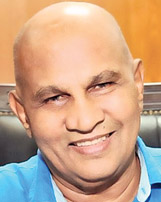 The human voice is stronger than the sound of guns now. This is a
democratic country and in a democracy people can express their feelings
freely. But everything that is said will not be implemented. The
government is considering proposals for constitutional reforms these
days. Until such time the proposals are considered and passed in
Parliament they will remain documents and ideas. The human voice is stronger than the sound of guns now. This is a
democratic country and in a democracy people can express their feelings
freely. But everything that is said will not be implemented. The
government is considering proposals for constitutional reforms these
days. Until such time the proposals are considered and passed in
Parliament they will remain documents and ideas.
There were so many suggestions on federal structures even earlier.
Even Sinhala leaders have spoken of federal forms of power-sharing
structures.
When I receive a copy of the resolution it will be presented to
President Maithripala Sirisena. But the President cannot take any
unilateral decisions. This document will be submitted to the
constitution-makers. The final structure of the future constitution will
be devised by Parliament.
They are yet to hand over a copy of the resolution to me. It needs to
be translated into Sinhala and a copy is expected next week.
People not politicians have maintained communal harmony - Gomin
Dayasri
The TNA’s resolution in the NPC seeking to merge the North and East
and call for a federal solution is ill- advised and ill-timed. The prime
purpose is to make the South react with an angry response and to defeat
the reconciliation and reconditioning purposes; which is the prime need
of the hour.
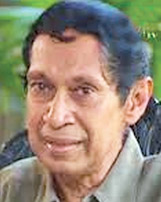 I believe S.W.R.D mentioned the word ‘federal’ in some context but to
extend it to the Sinhalese of the past of having mooted the concept, is
an exaggeration. I believe S.W.R.D mentioned the word ‘federal’ in some context but to
extend it to the Sinhalese of the past of having mooted the concept, is
an exaggeration.
The Northern code is to create smoke bombs that can escalate in
strength to reach nuclear heights unless kept in check. It is indeed
comforting that the people are wise not to react to whatever stupidity
the TNA maps out as they have prudently done after July ’83 where the
South lost badly due the idiocy of a few.
It expresses the vision of a dissected TNA, vocal and visible, while
the TNA’s Provincial Council has not serviced the genuine grievances of
the Tamil people in the North. North’s telling need is social, economic
and cultural ascendancy. Wigneswaran’s NPC’s performance is much less
effective than when Governor Chandrasiri functioned.
It has failed to spend the funds allotted to the Northern Province.
So what is the governance the TNA proposes to lead in the future?
Has the Provincial Council worked for the betterment of the North and
the East, than the Central governments of the two regimes under
governorship? The answer is ‘NO’ in capitals. Yet the Centre has failed
to communicate directly with the people of the North and the East to
learn their problems and be understood.
Parties in the South have hardly any representation in the North
because their policies are Southern-oriented. Ethnic issues can be
overcome if the main political parties are truly representative
islandwide.
Ethnic issues will remain thorny, if the Ministers of minorities in
the North are nominated rather than elected.
The Southern political parties must show a national outlook with
their policies to find their feet in the North. That will be the true
barometer to test public perception of the success of the reconciliation
process. Ethnic parties must disappear fast from the North and the
South.
A loose tongue can ignite a chain of events that can revive animosity
which upto now is in the backburner. One singular event can lead to the
undoing of much: fortunately it has not surfaced. The NPC is trying its
best to agitate the south.
It is the people not the politicians that have maintained the
equilibrium of communal harmony. Politicians have exploited situations
to their advantage. People have learnt to live in harmony.
Tamils do not want a regime change - A. Sarvesvaran
Senior Lecturer of Law at the Colombo Law Faculty and Course
Coordinator for Conflict and Peace Studies Program by the Faculty of
Graduate Studies A. Sarvesvaran
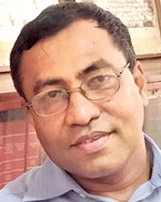 When it comes to achieving our goals, we have to be realistic. In the
South there is misunderstanding that federalism will lead to separatism.
In reality, power sharing will not divide a country, it will unite the
country but public perception is strong. There is mistrust and the
government is in a difficult situation. When it comes to achieving our goals, we have to be realistic. In the
South there is misunderstanding that federalism will lead to separatism.
In reality, power sharing will not divide a country, it will unite the
country but public perception is strong. There is mistrust and the
government is in a difficult situation.
Power-sharing cannot be done in one go, it is a step-by-step process.
It will be achieved when there is no mistrust. Since the words ‘unitary’
and ‘federal’ are words misunderstood by the two communities, it is
better to go for a new term. We can even coin a term. The solution must
be preceded by confidence-building.
The provincial council resolutions have no binding powers on the
Centre. The resolution can be considered as a set of proposals to the
constitutional committee. Under the 13th Amendment, the Councils cannot
pass statutes, they have to be sanctioned by the central government.
But on the subject of a merger, under Article 154 A (3) Parliament is
already empowered to bring in laws to facilitate the merger of two or
three adjoining provinces. It is already there in the present
constitution.
Proposing a merger of provinces is not unconstitutional or illegal.
It is a constitutional right of the Tamils.
But such actions may create other issues. When extremism is evident
from one community, it leads to a similar reaction from the other
community. It is a two-way thing. The Tamils do not want a regime
change, they have confidence in the present Government. They have more
freedom now to engage in political activity and lands are being
released. With regard to the release of political prisoners, the process
is slow but the relatives have some hope.
Taking all these into consideration, we have to be realistic and not
create situations that will lead to regime changes. |

